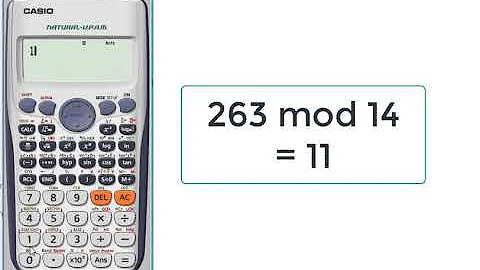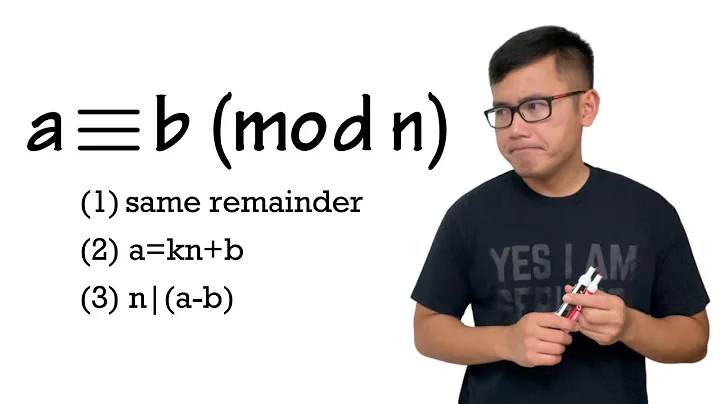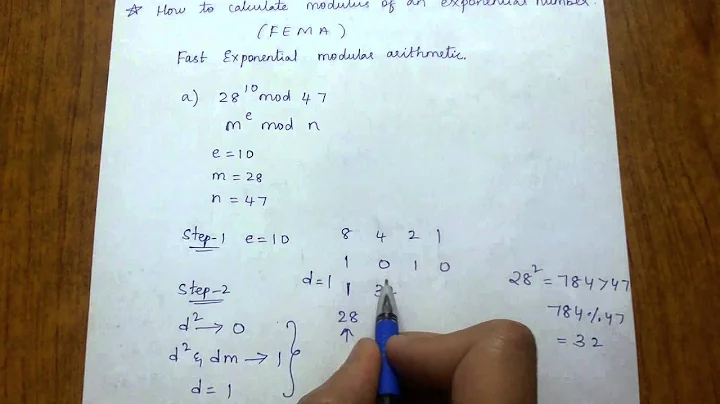Calculating (a^b)%MOD
Solution 1
That's a typical task. Please (or, really, PLEASE!) read about the Euler's totient function.
And then the Euler's theorem.
The thing is you can dramatically reduce a^b to a^(b % phi(MOD)). Yes, you will need some kind of an integer factorization method, but still, no crazy ideas about actually calculating the power needed.
We did such samples by hand in my youth :) Even when the numbers where far beyond 32/64 bit range.
EDIT: Well, you live and learn. In 2008 the result is obtained:
"The totient is the discrete Fourier transform of the gcd: (Schramm (2008))"
So to calculate phi(b) one does not need to know its factors.
EDIT(2):
And the Carmichael's function is what you need to calculate to get the correct answer for any a, b and MOD.
Solution 2
I use this function to solve this problem
UVA 374 - Big Mod
http://uva.onlinejudge.org/index.php?option=com_onlinejudge&Itemid=8&page=show_problem&problem=310
// a^b % T
// with Exponentiation by squaring (http://en.wikipedia.org/wiki/Exponentiation_by_squaring#Basic_method)
// if a very large use
// R=(unsigned long long)(R*a)%T;
int restOfPot(long long a,int b,int T)
{
a%=T;
long long R=1;
while(b)
{
if(b&1) R=(R*a)%T;
a=(a*a)%T;
b>>=1;
}
return int(R);
}
Solution 3
For dealing with very large numbers, take a look at boost's Multiprecision library. It has a powm() function that works for this purpose well.
From Generic Integer Operations :
template <class Integer> Integer powm(const Integer& b, const Integer& p, const Integer& m);Returns bp % m.
Example:
#include <boost/multiprecision/cpp_int.hpp>
boost::multiprecision::cpp_int pow("8912627233012800753578052027888001981");
boost::multiprecision::cpp_int mod("0x86f71688cdd2612c117d1f54bdae029");
boost::multiprecision::cpp_int base(12345);
boost::multiprecision::cpp_int result = powm(base, pow, mod);
std::cout << "result is: " << result << std::endl;
prints:
result is: 5758534182572671080415167723795472693
Related videos on Youtube
Gurpreet Singh
Updated on October 21, 2022Comments
-
Gurpreet Singh over 1 year
I want to code for calculating the value of pow(a,b)%MOD. I use C++ to code.
But the problem is the value of b can be very large. I know the log(b) time complexity method. But, the value of b might not fit in the data type "long long" of C++. For example b can be 1000000000 th Fibonacci number. Exact calculation of such a big number is itself, not possible (in time limits).
P.S. :
- pow(a,b) means a*a*a*a*... b times.
- X % MOD means the remainder obtained on dividing X by MOD.
-
 Viktor Latypov almost 12 yearsGuys, when it comes to number theoretical tasks, brute-force approaches are, to say the least, not the best way to solve the problem. A little NumberTheory 101 and you know about classical Euler's theorem. My answer has the appropriate link. I believe MOD is a usual integer which fits in a CPU's register and this makes the task a simple exercise in modular arithmetics.
Viktor Latypov almost 12 yearsGuys, when it comes to number theoretical tasks, brute-force approaches are, to say the least, not the best way to solve the problem. A little NumberTheory 101 and you know about classical Euler's theorem. My answer has the appropriate link. I believe MOD is a usual integer which fits in a CPU's register and this makes the task a simple exercise in modular arithmetics. -
 phuclvpossible duplicate of Calculating pow(a,b) mod n
phuclvpossible duplicate of Calculating pow(a,b) mod n
-
 Viktor Latypov almost 12 yearsIt's a number-theoretic question, really. No need to brute-force here. The whole point of the task is to show the superiority of some simple classic theorems. See my answer.
Viktor Latypov almost 12 yearsIt's a number-theoretic question, really. No need to brute-force here. The whole point of the task is to show the superiority of some simple classic theorems. See my answer. -
Gurpreet Singh almost 12 yearsThanks Viktor. I got what was desired. Thanks for the help... :-) BTW, I knew about the totient function, but not about that Euler's theorem...
-
Mario almost 12 yearsInteresting, guess you just stole my weekend's spare time, going to read up on that. :)
-
 Viktor Latypov almost 12 yearsThis book is nice: books.google.ru/books/about/Number_Theory.html?id=njgVUjjO-EAC Also the Ivan Vinogradov's books are good. The Jean-Pierre Serre's "Course d'arithmetique" opens even more possibilities.
Viktor Latypov almost 12 yearsThis book is nice: books.google.ru/books/about/Number_Theory.html?id=njgVUjjO-EAC Also the Ivan Vinogradov's books are good. The Jean-Pierre Serre's "Course d'arithmetique" opens even more possibilities. -
Mark Dickinson almost 12 years"So to calculate phi(b) one does not need to know its factors." This hardly looks like a practical method for computing
phi(b), though. -
 Viktor Latypov almost 12 years@MarkDickinson: Yes, that's why I added the remark about Schramm's paper. There's only a single discrete Fourier transform involved.
Viktor Latypov almost 12 years@MarkDickinson: Yes, that's why I added the remark about Schramm's paper. There's only a single discrete Fourier transform involved. -
Mark Dickinson almost 12 yearsSorry; that's what I meant: computing via the Fourier transform isn't going to be any more efficient than computing via factoring. (BTW, I believe the result on wikipedia attributed to Schramm is actually much much older.)
-
 Viktor Latypov almost 12 yearsI also believe that Schramm's result might have been known for a long time. The thing with Fourier... Yes, I see the weakness of my answer. Not a number theorist, unfortunately.
Viktor Latypov almost 12 yearsI also believe that Schramm's result might have been known for a long time. The thing with Fourier... Yes, I see the weakness of my answer. Not a number theorist, unfortunately. -
 chux - Reinstate Monica over 4 yearsMinor: Fails corner case:
chux - Reinstate Monica over 4 yearsMinor: Fails corner case:restOfPot(a,0, 1), Fix-able withlong long R=1%T; -
 Liju Thomas almost 3 yearsCan you summarize what you have done along with the solution?
Liju Thomas almost 3 yearsCan you summarize what you have done along with the solution?





